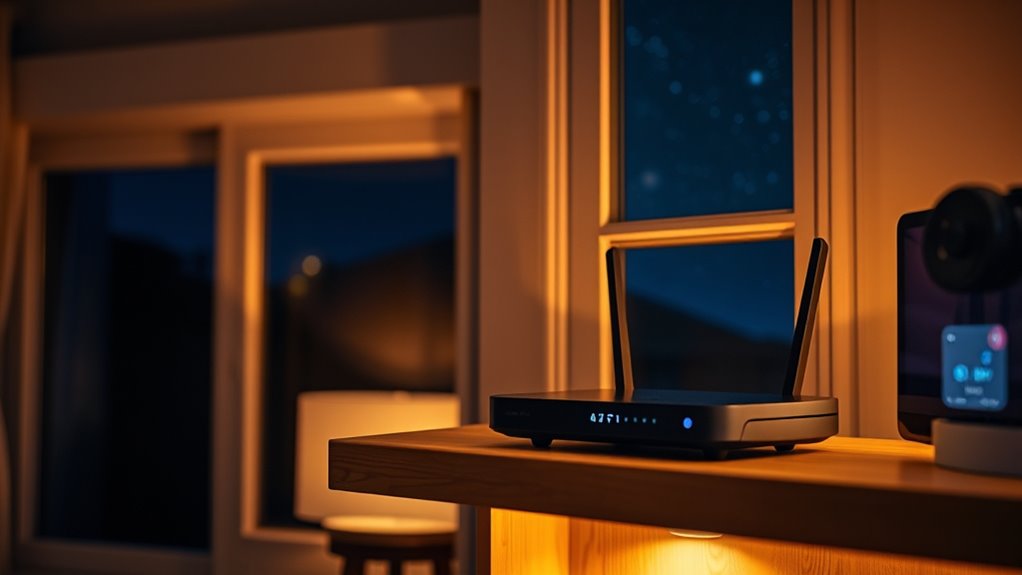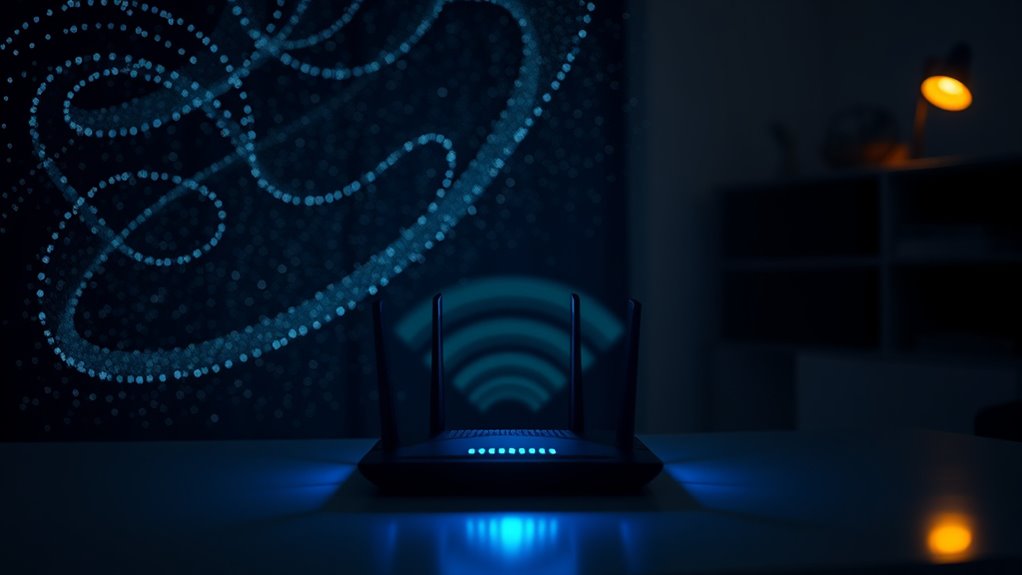Your Wi-Fi slows down at night mainly due to household devices like smart TVs, smartphones, and gaming consoles all competing for bandwidth, creating network congestion. Additionally, ISP overload during peak hours further reduces speeds, even if your setup is fine. Outdated firmware on your router can also limit its performance during busy times. If you want to discover simple fixes and how to boost your internet speed, keep exploring what’s causing these slowdowns.
Key Takeaways
- Network congestion from household devices increases at night, dividing bandwidth and slowing Wi-Fi speeds.
- ISP overload during peak hours can reduce overall internet speeds beyond your local network’s control.
- Outdated router firmware may impair performance when handling multiple devices during busy times.
- Using a high-capacity router or updating firmware improves traffic management and stability at night.
- Proper router placement and limiting active devices can help mitigate slowdowns during peak usage hours.

If your Wi-Fi slows down at night, you’re not imagining things. Many people assume that their neighbors or external interference are to blame, but often, the culprit lies closer to home—within your own network setup. One key factor is router firmware. When your router’s firmware isn’t up to date, it can struggle to handle the demands placed on it during peak usage hours. Manufacturers release updates to improve performance, fix bugs, and enhance security. Failing to keep your router firmware current can lead to slower speeds, especially when multiple devices are active at night. Updating your firmware is usually straightforward; visit your router manufacturer’s website or access the admin panel to check for updates. Regular updates ensure your router operates efficiently and can better manage network traffic. Additionally, high refresh rates in your network hardware can help maintain stable speeds during busy hours.
Another noteworthy factor is network congestion. During evening hours, many devices in your household—smartphones, tablets, smart TVs, gaming consoles—connect simultaneously, creating a surge in network traffic. This congestion causes your Wi-Fi to slow down because the available bandwidth gets divided among all connected devices. Think of it like a busy highway: the more cars on the road, the slower each one moves. When many devices are streaming videos, downloading files, or gaming, they compete for the same limited bandwidth, leading to noticeable slowdowns.
Network congestion isn’t just a local issue; your internet service provider (ISP) can also contribute. During peak hours, the ISP’s network may become overloaded, reducing overall speed for all users in your area. While you can’t control your ISP’s traffic management, you can make your local network more efficient. For example, prioritize critical devices or activities, or schedule large downloads during off-peak hours.
To combat these issues, start by updating your router firmware. This simple step can considerably improve your network’s ability to handle multiple devices and reduce congestion. Additionally, consider optimizing your Wi-Fi setup by placing your router in a central location, away from interference, and using dual-band or mesh networks to distribute traffic more effectively. Limiting the number of active devices during peak hours can also help. If your Wi-Fi continues to slow down despite these efforts, upgrading to a higher-capacity router or contacting your ISP for a faster plan might be necessary.
Frequently Asked Questions
Can Household Appliances Interfere With Wi-Fi Signals at Night?
Yes, household appliances can interfere with your Wi-Fi signals at night. Electromagnetic interference from devices like microwave ovens, cordless phones, or baby monitors creates appliance interference, which weakens your Wi-Fi connection. When these appliances operate, especially during nighttime, they emit signals that disrupt the Wi-Fi frequency. To improve your connection, try turning off or relocating appliances that may cause electromagnetic interference near your router.
Do Streaming Services Contribute to Wi-Fi Congestion After Hours?
Your Wi-Fi can get overwhelmed like a traffic jam during rush hour, especially at night. Streaming services cause significant congestion, as they consume massive bandwidth. Plus, your router’s device prioritization might not favor your gaming or work devices, slowing everything down. When everyone’s binge-watching or downloading, it’s no wonder your internet feels like it’s crawling. Managing streaming congestion and tweaking device priorities can help keep your connection smooth.
How Does the Time of Day Affect Wi-Fi Signal Strength?
You notice your Wi-Fi signal strength varies throughout the day. During peak hours, signal interference and network congestion increase as many devices connect simultaneously, causing your connection to slow down. In the evenings, more people streaming or gaming overloads the network, reducing your Wi-Fi’s performance. To improve this, try changing your Wi-Fi channel or scheduling heavy downloads during off-peak hours.
Can My Router’s Settings Cause Slower Speeds at Night?
Did you know that over 60% of Wi-Fi issues stem from router settings? Yes, your router’s firmware updates and channel settings can cause slower speeds at night. If your firmware is outdated or your router is set to a crowded channel, it slows down when many devices connect. Check and update your firmware, and switch to less congested channels to boost your Wi-Fi performance during peak hours.
Are There Specific Devices That Typically Slow Down Wi-Fi at Night?
You might notice your Wi-Fi slows down at night because certain devices, like smartphones and smart home gadgets, can cause interference. Smartphones often sync updates or backups during late hours, consuming bandwidth. Smart home devices, such as security cameras or smart speakers, also run updates or stream data, which can clog your network. These devices often operate in the same frequency, leading to slower speeds as night progresses.
Conclusion
So, next time your Wi-Fi slows down at night, remember it’s not just your neighbors hogging the bandwidth. Instead, hidden factors like your own devices or even your home’s wiring could be the culprits. It’s ironic how something so essential can be affected by the quiet chaos inside your house. By understanding these behind-the-scenes issues, you can reclaim your fast connection, turning frustrating nights into smooth, seamless browsing—proving that sometimes, the biggest problems are closer than you think.










